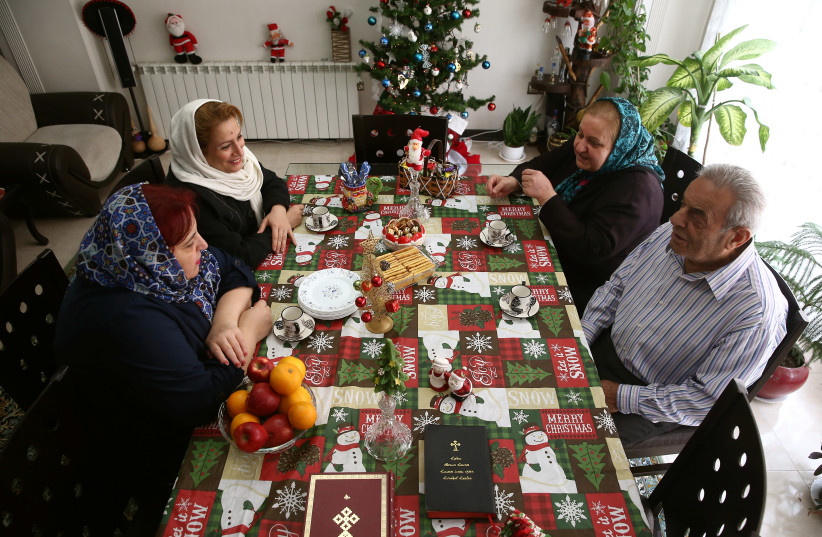
The men are among tens of thousands of Christians who face the daily threat of arrest, interrogation, pressure to recant, and being forced to commit not to engage in Christian activities or engage with other Christians. Others have seen their children denied access to education, and while many have now fled the country, relatives who remain behind are also under threat of being targeted.
According to the report by Christian Solidarity Worldwide (CSW) in collaboration with Article 18, Middle East Concern and Open Doors International, conservative estimates place the number of Christians in Iran at 500,000 to 800,000. Assyrian and Armenian Christians constitute around 250,000 of these, but the remainder are converts from Islam, the majority of whom belong to the Protestant house-church movement and therefore in violation of Iranian law.
The first article of Iran’s Constitution establishes the country as a theocracy, while Article 12 stipulates that Islam and the Twelver Ja’fari school of Shia Islam is the nation’s official religion.
Article 13 states “Zoroastrian, Jewish, and Christian Iranians are considered the only recognized religious minorities. They may exercise their religious ceremonies within the limits of the law. They are free to exercise matters of personal status and religious education and follow their own rituals.” Islamic converts to Christianity therefore fall outside the law, as does the holding of services or possession of non-Islamic religious materials in any language other than Persian.
In January and February, nine Christian converts were arrested in Rasht: Abdolreza (Matthias) Haghnejad, Khalil Dehghanpour, Hossein (Elisha) Kadivar, Kamal Naamanian, Mohammad Vafadar, Mohammad (Shahrooz) Eslamdoust, Babak Hosseinzadeh, Mehdi Khatibi and Behnam Akhlaghi.
In July, according to the report, the nine converts to Christianity were accused of “acting against national security” and “promoting Zionism.” Detaining them in Evin Prison, the judge set their bail at 1.5 billion tomans, equivalent to $180,000 each, a figure the report describes as an “exaggerated amount,” given that others arrested on similar charges had had bail set at between 10 million tomans ($900) and 100 million tomans ($9,000).
In October, all nine men were sentenced to five years in prison for “acting against national security.” Five of the men were jailed in Evin Prison, while the other four were conditionally released pending appeal. Their arrests were just one example of dozens given in the report, which further stated: “According to public sources 17 Iranian Christians were held in detention at the end of 2019 on charges related to their faith, having either started sentences in 2019 or continued to serve sentences issued in previous years. It should be noted that the actual number of these detainees is higher; however, many cases have either not been made public or have gone unreported.”
In another case, three Christians in the Fars province were arrested and interrogated harshly in September 2018 finally being sentenced in December 2019 following a failed appeal to six month’s imprisonment for “propaganda against the system through promoting Zionist Christianity”. All three are currently detained at Eghlid prison.
CSW’s Chief Executive Mervyn Thomas said: “This report is an important reminder of the ongoing plight of Christians in Iran, who continue to experience a wide range of violations of their right to freedom of religion or belief on a daily basis as the Iranian government effectively criminalizes a faith it claims to recognize.”
The report makes a number of recommendations to improve the religious freedoms of minorities in Iran, first and foremost of which is the “immediate and unconditional release of Christians detained on spurious charges related to their faith or religious activities.”
The authors point out that persecution of religious minorities by the Iranian authorities contravenes Article 18 of the International Covenant on Civil and Political Rights (ICCPR), which Iran ratified in 1975.
Further recommendations include the Iranian government amending Article 13 of the Iranian constitution to include converts in order to fully recognize freedom of belief for all people, “as envisaged in Article 18 of the ICCPR, to which Iran is party, without reservation, and therefore legally bound to respect.”
It has also called on the international community to do more to hold Iran to account, appealing specifically to the UN’s Special Rapporteur on freedom of religion or belief, Ahmed Shaheed, to investigate ongoing violations of freedom of religion waged against Iran’s religious minorities.
Thanking the UN Special Rapporteur on the human rights situation in Iran, Javaid Rehman, for raising the issues faced by Christians, and in particular Christian converts, in Iran, the report’s authors called on Iran to grant him access to the country in order for him to more thoroughly investigate Iran’s compliance with the international human rights legislation to which it is party.
Thomas said: “We reiterate our call on Iran to enable full enjoyment of the right to freedom of religion or belief for all of its citizens, and we urge the government and the international community to take forward the recommendations made in the report as a matter of urgency.”



